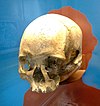The National Museum of Brazil collections included an exhibition of fossils.[1]

The current status of the collection is unknown after the fire that destroyed the museum in September 2018.
| Image | Name | Age | Period | Origin | Notes |
|---|---|---|---|---|---|

|
Angaturama limai skeleton, indeterminate pterosaur skeleton and a spinosaur sacrum (possibly belonging to Angaturama or Irritator) | 110 Ma | Early Cretaceous | Santana Formation | [2] |

|
Lambeosaurus skull | 75 Ma | Late Cretaceous | Dinosaur Park Formation | |

|
Tyrannosaurus rex skull | 65 Ma | Late Cretaceous | ||

|
Luzia Woman | 11 ka | Found in Lapa Vermelha IV, Lagoa Santa, Minas Gerais, Brazil | ||

|
Dinodontosaurus skeleton | 290-225 Ma | Permian-Triassic | Santa Maria Formation | |

|
Santanaraptor skeleton | 110 Ma | Early Cretaceous | Santana Formation | |

|
Saber-toothed cat skeleton | 1.8 Ma | Pleistocene | ||

|
Odonata fossil | 105 Ma | Early Cretaceous | Crato Formation | [3] |

|
Maxakalisaurus topai skeleton (replica) | 80 Ma | Late Cretaceous | Adamantina Formation | [4] |

|
Pterosaur wing | ||||

|
Eremotherium skeleton | 1.8 Ma | [5] | ||

|
Ruffordia goepperti | ||||

|
Tupandactylus skeleton | 115 Ma | Early Cretaceous | Crato Formation | |

|
Tropeognathus mesembrinus skeleton | 110 Ma | Early Cretaceous | Santana Formation | |

|
Dastilbe crandalli | 105-110 Ma | Early Cretaceous | Crato & Santana Formations | [6] |

|
Psaronius brasiliensis | 270 Ma | Permian | Piauí | [7] |

|
Spiders | 105 Ma | Early Cretaceous | Crato Formation | [8] |

|
Annularia, Asplenites, Bornia, Calamites, Cyclopteris, Equisetites, Glockeria, Hymenophylites, Lepidodendron, Lepidophyllum, Neuropteris, Odontopteris, Pecopteris, Sphenopteris, Sigillaria, Stigmaria, Volkmannia, Woodwardites | Carboniferous | Europe | [9] | |

| |||||
| Protoischnurus axelrodorum | 105 Ma | Early Cretaceous | Crato Formation | [10] | |
| Araripemys barretoi | 110 Ma | Early Cretaceous | Santana Formation | [11] | |
| Bauruemys elegans | 80 Ma | Late Cretaceous | Presidente Prudente Formation | [12] | |
| Beurlenia araripensis | 105 Ma | Early Cretaceous | Crato Formation | [13] | |
| Araripichthys castilhoi | 105-110 Ma | Early Cretaceous | Crato & Santana Formations | [14] | |
| Stereosternum | 275 Ma | Permian | Irati Formation | [15] | |
| Lizard | 105 Ma | Early Cretaceous | Crato Formation | [16] |
See also
editWikimedia Commons has media related to Fossils in the Museu Nacional, Rio de Janeiro.
References
edit- ^ "Paleontologia" (in Portuguese). National Museum of Brazil. Archived from the original on 3 September 2018. Retrieved 5 September 2018.
- ^ "Angaturama limai". Archived from the original on 2018-09-06. Retrieved 2018-09-06.
- ^ "Odonata". Archived from the original on 2018-09-06. Retrieved 2018-09-06.
- ^ "Maxakalisaurus topai (replica)". Archived from the original on 2018-09-06. Retrieved 2018-09-06.
- ^ "Eremotherium". Archived from the original on 2018-09-06. Retrieved 2018-09-06.
- ^ "Dastilbe crandalli". Archived from the original on 2018-09-06. Retrieved 2018-09-06.
- ^ "Psaronius brasiliensis". Archived from the original on 2018-09-06. Retrieved 2018-09-06.
- ^ "Spider". Archived from the original on 2018-09-06. Retrieved 2018-09-06.
- ^ Sequeira Fernandes et al., 2014, p.10
- ^ "Protoischnurus axelrodorum". Archived from the original on 2018-09-06. Retrieved 2018-09-06.
- ^ "Araripemys barretoi". Archived from the original on 2018-09-06. Retrieved 2018-09-06.
- ^ "Bauruemys elegans". Archived from the original on 2018-09-06. Retrieved 2018-09-06.
- ^ "Beurlenia araripensis". Archived from the original on 2018-09-06. Retrieved 2018-09-06.
- ^ "Araripichthys castilhoi". Archived from the original on 2018-09-06. Retrieved 2018-09-06.
- ^ "Stereosternum". Archived from the original on 2018-09-06. Retrieved 2018-09-06.
- ^ "Lizard". Archived from the original on 2018-09-06. Retrieved 2018-09-06.
Bibliography
edit- Sequeira Fernandes, Antonio Carlos; de Araujo Carvalho, Marcelo; Almeida, Daianne; Witovisk, Luciana (2014), "O Museu Nacional, suas análises de carvão mineral e a coleção de fósseis vegetais carboníferos no século XIX" (PDF), Filosofia e História da Biologia, 9: 1–18, retrieved 2018-09-06